We have been thinking a lot lately about imposter syndrome. Specifically, why it is such an epidemic for women in BigLaw. There is so much written about it these days. A recent Google search of the term found 6,270,00 results. Evidently, most everyone feels like an imposter. Amy Cuddy’s research supports this idea. She found that 80% of men and women have felt like an imposter at one time. Having said that, the research shows that minority groups in companies that are predominately white male – including women and people of color – feel it more acutely and pervasively than the majority group members. Based on our experience, we observe the following reasons why:
1) The Law Firm System – The law firm system was built by and for white men with stay at home wives. Women are most often in the minority in their firms and practice groups. They often don’t see themselves in the typical success profile which historically has been made up of white males with the ability to work single-mindedly 24/7. On the face of it, this is not a women. Moreover, women lawyers often have not found a mentor who they aspire to become hence they believe they must not belong. For women of color, the issue is even more acute.

A recent HBR article Stop Telling Women They Have Imposter Syndrome puts a finer point on the subject and posits that imposter syndrome is not an individual problem but a systemic problem resulting from unconscious and conscious bias. The author writes, “As white men progress, their feelings of doubt usually abate as their work and intelligence are validated over time. They’re able to find role models who are like them, and rarely (if ever) do others question their competence, contributions, or leadership style. Women experience the opposite.” There is so much to think about here particularly when you layer on the impact of judgements and feedback around childcare responsibilities.

2) Perfectionism – Research supports the idea that women tend to have more perfectionist tendencies than men. See The Confidence Gap. Most women in BigLaw have been extraordinarily successful meeting superlative external standards of success: grades, schools, leadership roles, and other accomplishments. They then carry those perfectionist expectations into the practice of law. The problem is, there is no perfect in the practice of law. Perfectionists, by their very nature, feel like a fraud because perfect does not exist. When someone does not meet up to their own idealized standard of perfection, they feel like an imposter.
3) The Culture of Law Firms – The culture of law firms perpetuates and affirms the myth that lawyers don’t make mistakes. Even though people are making mistakes all the time, rarely does anyone talk about it – let alone discuss what they learned from it. So when someone does make a mistake (and everyone does) that person thinks they are the only one. Therefore, they must not be good enough – an imposter.
4) Billing Rates – The billing rates in BigLaw are extremely high. Lawyers often wonder how they can possibly be worth XYZ per hour.
We imagine you can think of other reasons women in BigLaw feel like a fraud. Please send us your ideas. We are hoping the more that we understand and normalize the feeling, the faster it will dissipate. For strategies on how to combat imposter syndrome, see our newsletter.
